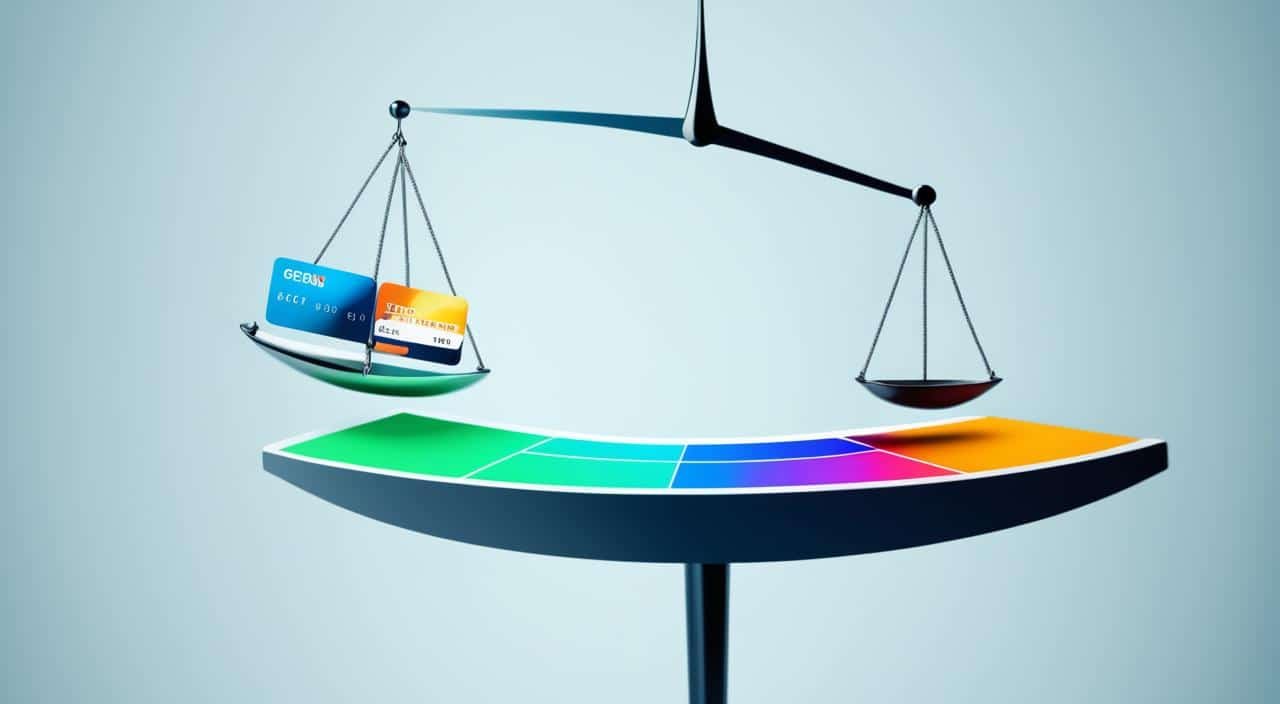What Is A Credit Card Balance?
A credit card balance is the total money you owe to your credit card company. It changes with your spending and payments. When you buy things, your balance goes up. When you pay back, it goes down.
Any money left over at the end of the month gets added to your next bill. You might also get charged interest on it.
Your credit card balance affects your credit score. Lenders look at it to see if they should give you more credit. A big balance can hurt your score. Keeping your balance low can help it.
Key Takeaways
- A credit card balance is the total amount owed to a credit card issuer.
- Balances change based on purchases, payments, and any interest or fees charged.
- Credit card balances are a key factor in determining a person’s credit score.
- Maintaining low credit card balances can help improve credit scores.
- Understanding credit card balances is important for managing credit and personal finances.
Understanding Credit Card Balances
Credit cards let you buy things now and pay later. They also make paying secure. The credit card balance is what you owe your credit card issuer. It changes every month based on your credit card use. This includes purchases, balance transfers, foreign exchange, fees, and interest charges. Your credit card balance updates within 24 to 72 hours after a purchase or payment.
Key Factors Influencing Credit Card Balances
Several factors affect your credit card balance:
- Purchases and Transactions – Every purchase adds to your credit card balance.
- Payments and Credits – Payments reduce your balance. If you return an item, you get a credit that changes your balance.
- Interest Charges and Fees – Your credit card issuer might charge interest and fees, adding to your balance.
“Monitoring your credit card balance is key to keeping your finances in check and avoiding high interest charges and fees.”
Definition of Credit Card Balance
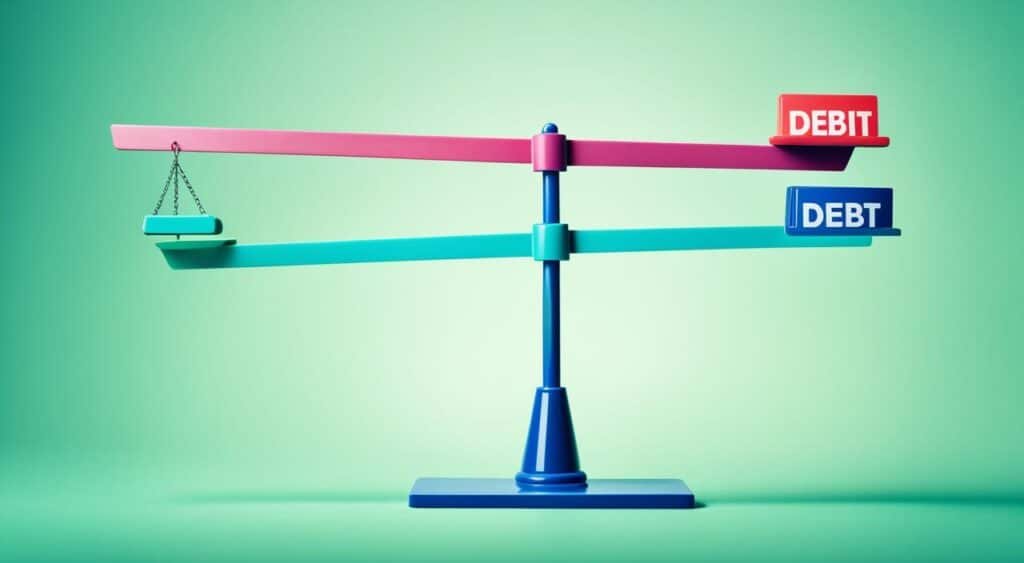
A credit card balance is the total money a cardholder owes to their credit card company. It includes all purchases, balance transfers, and cash advances. This is the amount of credit used and must be paid back.
Total Amount Owed to Credit Card Issuer
The credit card balance is the total debt a cardholder owes to their credit card company. This balance changes with each transaction or payment. It’s the main part of the credit card agreement and shows the cardholder’s debt to the credit card issuer.
Purchases, Balances Transferred, and Cash Advances
- Purchases add to the credit card balance.
- Transferring balances from other cards increases the amount owed.
- Cash advances also add to the credit card balance.
The credit card balance is the total debt the cardholder owes their credit card issuer. This includes different types of transactions.
| Transaction Type | Impact on Credit Card Balance |
|---|---|
| Purchases | Increases the credit card balance |
| Balance Transfers | Increases the amount owed to the credit card issuer |
| Cash Advances | Contributes to the overall credit card balance |
“The credit card balance is the core of the credit card agreement and represents the cardholder’s financial obligation to the credit card issuer.”
Checking Your Credit Card Balance
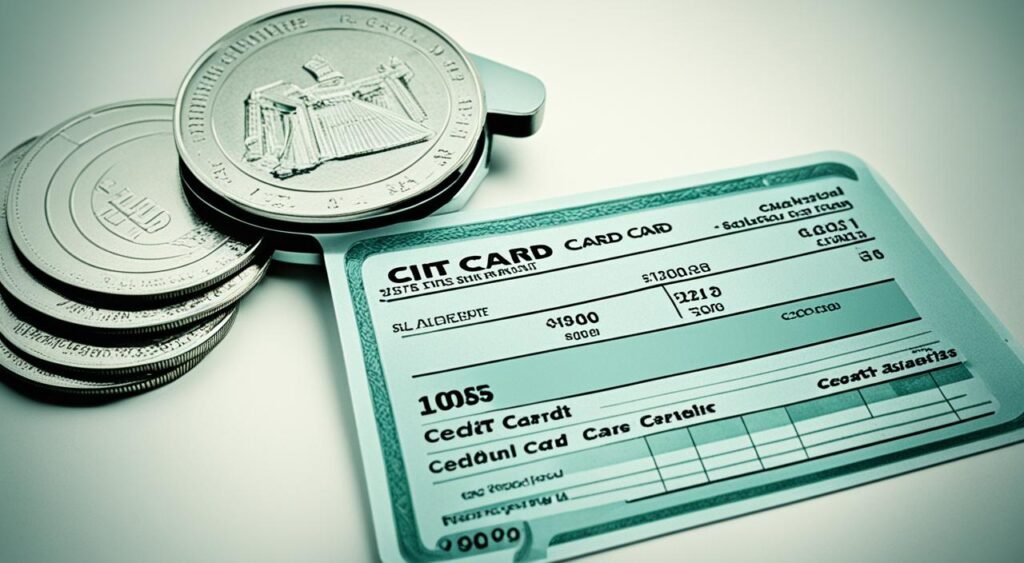
It’s important to keep an eye on your credit card balance to stay in control of your finances. There are easy ways to see your balance anytime.
Online Account Portal and Mobile App
Logging into your credit card company’s online account is the simplest way to check your balance. Many companies also have mobile apps. These let you see your balance and track your spending anytime, anywhere.
Monthly Statement Review
Your monthly statement is another good way to check your balance. It shows your current balance and all the transactions that changed it. This includes new purchases and any credits. Looking at your statement helps you understand your spending and spot any strange charges.
Customer Service Inquiry
If you’d rather talk to someone, you can call your credit card company’s customer service. This is great if you’re unsure about a charge or need help with your account.
Checking your credit card balance often, through online tools, statements, or customer service, keeps you in charge of your money. It also lets you spot any problems early.
Credit Card Balance Calculation
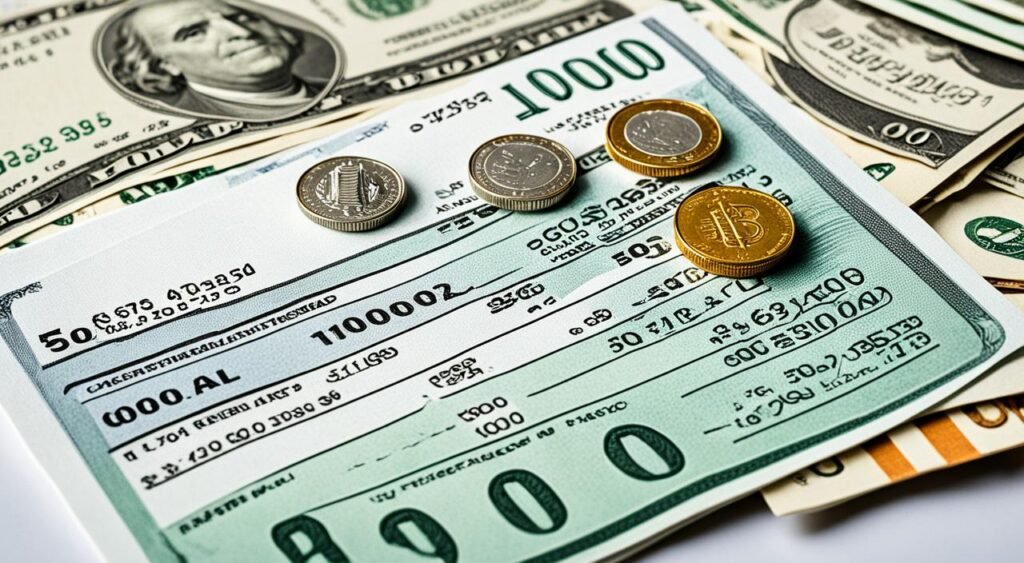
Knowing your credit card balance is key to managing your money well. It’s made up of your recent buys, payments, interest, and fees or statement credits.
Considering Recent Purchases and Payments
Your balance shows your recent buys and payments. Keeping an eye on your spending and payments helps keep your balance right.
Accounting for Interest and Fees
Interest and fees can change your balance too. Interest comes from your average daily balance and your card’s APR. Your issuer might also add fees like annual or over-the-limit fees.
Statement Credits Application
Statement credits can also affect your balance. These are credits for things like returned items or account credits. They reduce what you owe.
Knowing what affects your balance helps you manage your spending. It helps you avoid extra interest and stay financially healthy.
Credit Card Balance
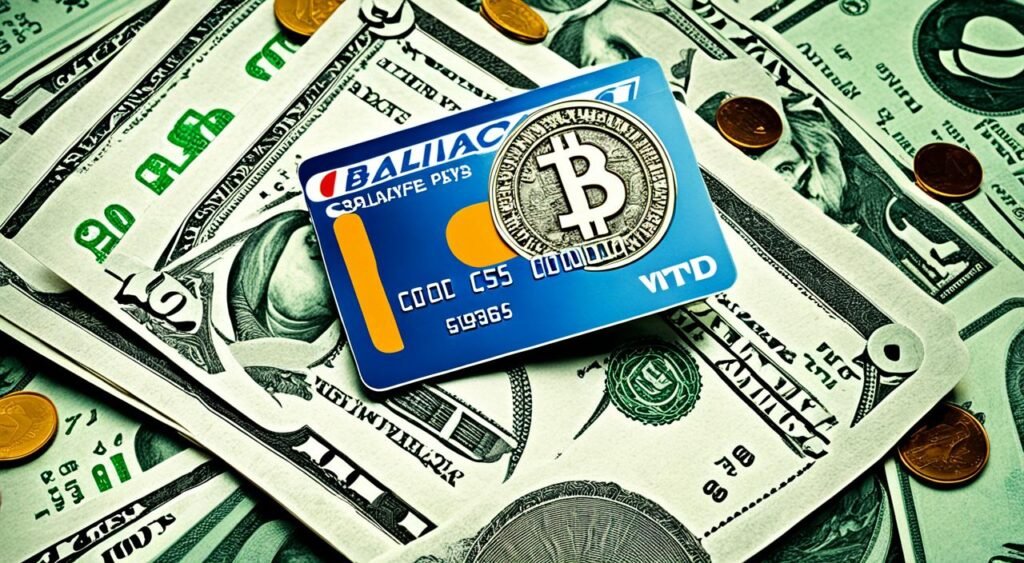
A credit card balance is the total money you owe to your credit card company. This amount changes due to purchases, payments, interest, and fees. It’s key to know your balance to manage your money well.
Your balance is what you owe after all recent transactions. This includes buys, balance moves, cash advances, and interest or fees. Keeping an eye on your balance helps with budgeting, avoiding late fees, and keeping a good credit score.
Monitoring Your Credit Card Balance
Here are ways to keep an eye on your credit card balance:
- Online account portal or mobile app: Many credit card companies let you see your balance anytime.
- Monthly statement review: Your monthly statement shows your balance, recent buys, and any interest or fees.
- Customer service inquiry: Call your credit card company’s customer service to ask about your balance and recent activity.
Checking your credit card balance often helps you manage your spending. It lets you spot any unauthorized charges. This way, you can make better payment and financial choices.
“Staying on top of your credit card balance is the key to maintaining financial health and a strong credit score.”
Impact of Credit Card Balance on Credit Score
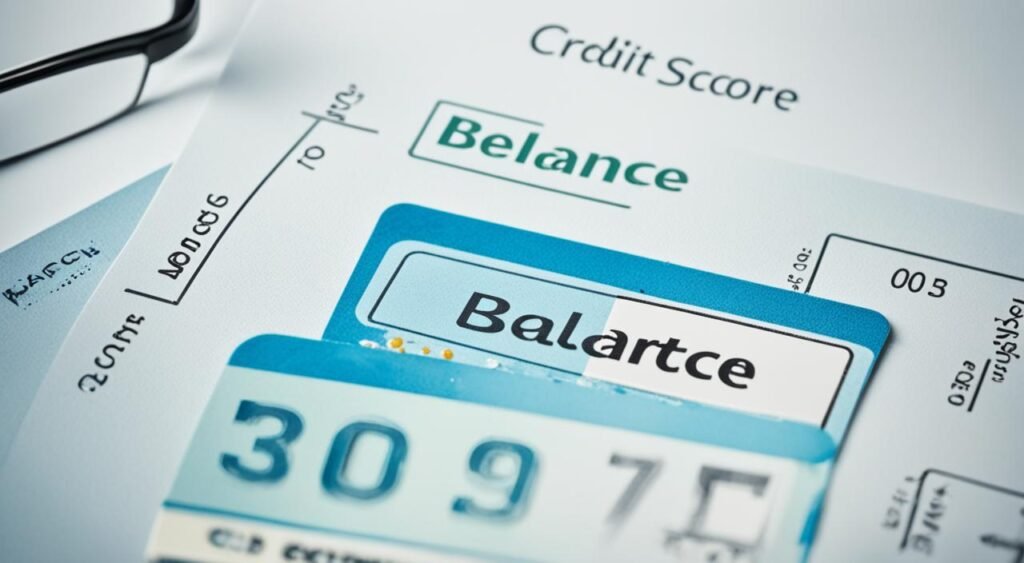
Managing your credit card balance is key to a good credit score. The amount you use compared to your total credit is crucial. This is known as your credit utilization ratio.
Credit Utilization Ratio
Experts say keep your credit utilization below 30% for a good score. Using a lot of your credit can hurt your score. Lenders see this as a sign of financial stress, making you seem riskier.
Maintaining Low Balances for Better Scores
Paying down your balance helps improve your scores over time. Lowering your credit utilization shows you handle credit well. This can lead to a higher score, opening better financial doors for you.
| Credit Utilization Ratio | Impact on Credit Score |
|---|---|
| Below 30% | Positive impact on credit score |
| Above 30% | Negative impact on credit score |
Keeping a low credit card balance is key for a good score. Watch your credit utilization and pay on time to control your credit and succeed financially.
“Keeping your credit utilization ratio low is one of the best ways to maintain a healthy credit score.”
Paying Your Credit Card Balance
Managing your credit card balance well means paying your statement balance in full each month before it’s due. This way, you avoid interest charges on what you buy, keeping your costs low.
Paying the Statement Balance in Full
Paying the full statement balance each month keeps your credit card account healthy. It shows you can handle your pay credit card balances well. This can also improve your credit score over time.
Avoiding Interest Charges
By paying the statement balance in full, you avoid interest charges that would add up on your balance. This keeps more of your money in your pocket and saves you from extra fees from your credit card company.
Timely Minimum Payments
If you can’t pay the full statement balance, at least make the minimum payment on time. This avoids late fees and penalties, which can hurt your credit score. But, paying just the minimum means you’ll keep getting charged interest on what’s left.
“Paying your credit card balance in full each month is the best way to maintain a healthy financial profile and avoid unnecessary interest charges.”
Managing High Credit Card Balances
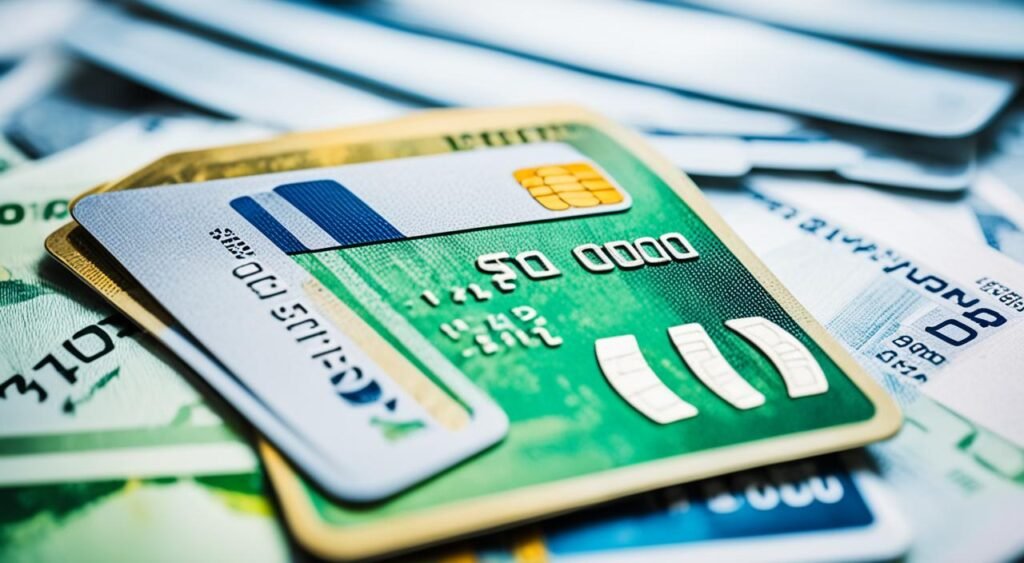
If you’re struggling with high credit card balances, there are ways to help. You can use a balance transfer or debt consolidation loans. Both can lower your interest rates and make your debt easier to handle.
Balance Transfer to Lower Interest Card
A balance transfer moves your high-interest debt to a card with lower rates. This can save you money on interest and help you pay off debt faster. When looking for a balance transfer, compare rates, fees, and the introductory period to find the best card for you.
Debt Consolidation Loans
Debt consolidation loans combine your debts into one payment. They often have lower rates than credit cards, making it easier to pay off debt. When looking into debt consolidation, find the best terms and make sure the loan’s rate is lower than what you’re paying now.
Debt Snowball Method
- The debt snowball method is a great way to manage high credit card balances.
- This method focuses on paying off the smallest balances first, giving you a sense of progress.
- By quickly paying off small balances, you’ll feel motivated to tackle the larger ones.
Choosing a strategy is important, but staying disciplined and making consistent payments is key. With the right plan, you can take control of your finances and work towards being debt-free.
Credit Card Balance Terms
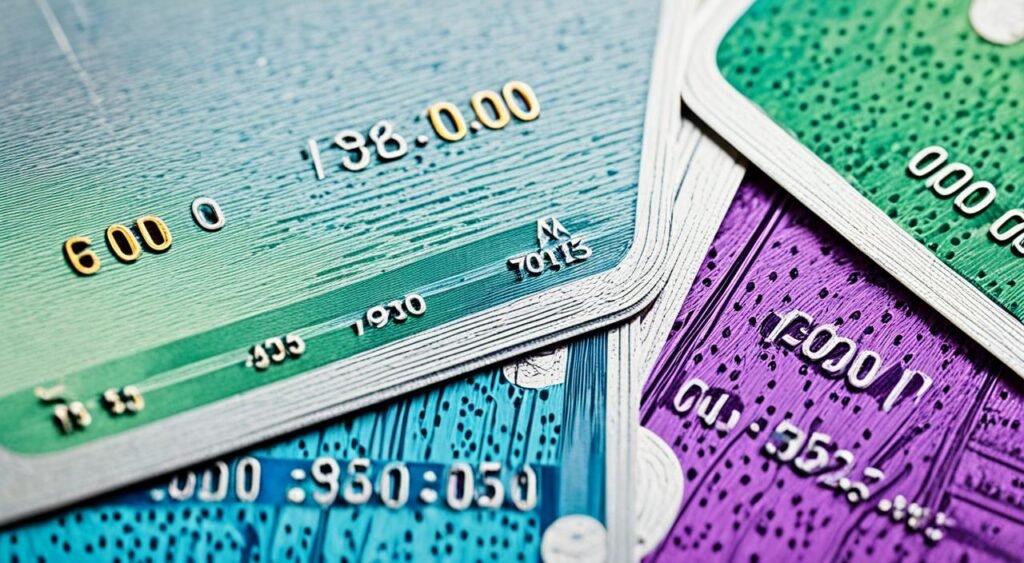
Understanding credit card balances can be tricky, but knowing the main terms is key to managing your money well. Let’s look at the differences between statement balance, current balance, minimum payment, and statement credits.
Statement Balance vs. Current Balance
The statement balance shows what you owe at the end of your billing cycle. It’s the amount you’ll see on your monthly statement. The current balance, however, shows what you owe now, including any new purchases or payments.
Minimum Monthly Payment
The minimum monthly payment is the least you must pay by the due date to avoid extra fees. It’s usually a part of your statement balance or a set amount, whichever is more.
Statement Credits
Statement credits are amounts taken off your balance, like from returned items or special offers. These credits can lower your credit card balance terms and cut down on interest charges.
| Term | Definition |
|---|---|
| Statement Balance | The total amount owed at the end of your billing cycle |
| Current Balance | The up-to-date amount you currently owe, including recent transactions |
| Minimum Payment | The lowest amount you must pay by the due date to avoid late fees |
| Statement Credits | Credits applied to your balance, such as from returned purchases |
Knowing these important credit card balance terms helps you manage your credit card better. It helps you avoid extra fees and keep your finances in good shape.
Benefits of Monitoring Credit Card Balance
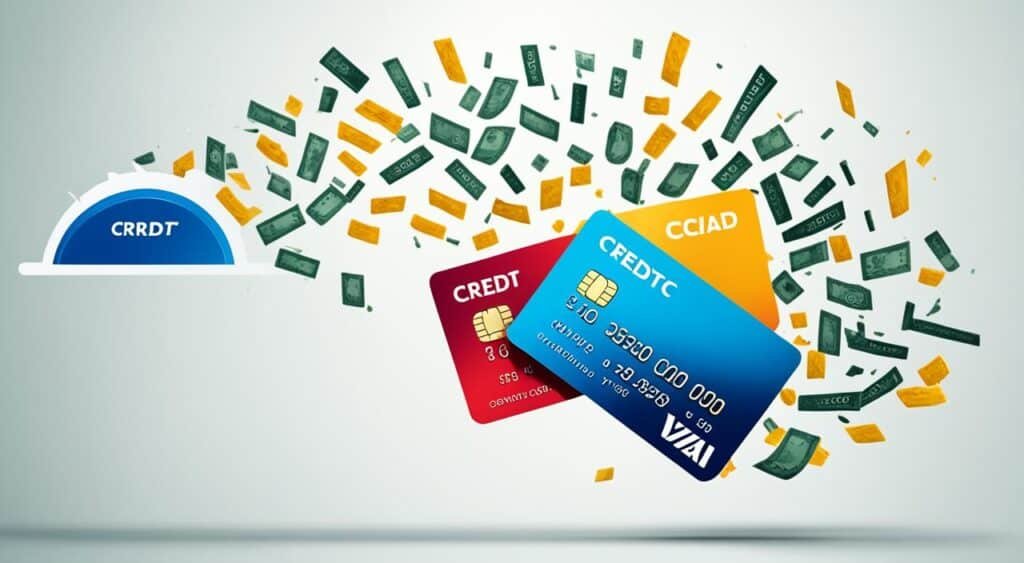
Keeping an eye on your credit card balance does more than just help avoid interest. It keeps you on track with your budget and lets you control your spending. It also helps you spot and fix any weird or fake charges fast.
Budgeting and Spending Control
By watching your credit card balance closely, you learn how you spend money. This lets you make smarter choices about what to buy. It keeps you from spending too much and helps you meet your financial goals.
Detecting Fraudulent Activity
Checking your credit card balance often can catch fraudulent activity. If you see odd charges, you can tell your credit card company right away. This stops fraud in its tracks and keeps your card safe for real purchases. balance transfer fee card payments , credit card interest , credit bureaus, credit card with a lower revolving credit pay off credit card debt outstanding balance minimum payment by the due date.
| Benefit | Description |
|---|---|
| Budgeting and Spending Control | Monitoring your credit card balance helps you stay within your budget and maintain control over your spending. |
| Detecting Fraudulent Activity | Regularly reviewing your balance can help you quickly identify and address any suspicious or fraudulent activity on your account. |
“Keeping a close eye on your credit card balance is essential for maintaining financial discipline and safeguarding your personal information.”
Also Read: Exploring The Impact Of Credit Risk On Financial Institutions
Conclusion
Learning how to handle your credit card balance is key to keeping your finances stable and your credit score healthy. It’s important to know how your balance is figured out, keep an eye on it, and use smart payment strategies. This way, you can dodge high interest fees, lower your credit use ratio, and manage your spending better.
Being careful with your credit card balance helps you make smart choices that fit your financial goals. You might pay off the whole balance to skip interest, use balance transfer deals to cut down on high-interest debt, or follow a debt snowball plan. Taking charge of your credit card balance can greatly improve your financial health.
By focusing on watching and wisely managing your credit card balance, you’re taking a big step towards financial safety and a stronger credit score. This knowledge is a solid base for better credit card use and setting yourself up for long-term financial success.
FAQs
Q: What is a credit card balance?
A: A credit card balance refers to the amount of money owed to the credit card company for purchases made using the card. It includes any outstanding charges, fees, and interest that accumulate on the card.
Q: How is a credit card balance calculated?
A: The credit card balance is calculated by adding up all the charges, fees, and interest accrued during a specific billing cycle. This total amount is then subtracted from any payments or credits applied to the card to determine the remaining balance.
Q: How does a credit card balance affect your credit score?
A: The amount of credit card debt you carry, also known as your credit card balance, can significantly impact your credit score. High balances relative to your credit limit can lower your credit score, while consistently paying off your balance on time can improve it.
Q: What is the difference between a current balance and a statement balance?
A: The current balance on your credit card account reflects all transactions, including recent purchases, fees, and interest charges up to the present moment. The statement balance, on the other hand, is the amount due at the end of a billing cycle, as stated on your credit card statement.
Q: How can balance transfer credit cards help in managing credit card debt?
A: Balance transfer credit cards allow you to transfer existing credit card debt to a new card with a lower interest rate, making it easier to pay off the balance. This can save you money on interest charges and help you consolidate and manage your debt more effectively.
Q: Does carrying a balance on a credit card have any benefits?
A: While it’s generally recommended to pay off your credit card balance in full each month to avoid interest charges, carrying a balance can sometimes be useful for large purchases or emergencies. However, it’s essential to manage the balance carefully to prevent accumulating excessive debt.
Q: How does a credit card balance impact your ability to make purchases?
A: The balance on your credit card represents the amount of credit you have used up, reducing your available credit limit. If your balance approaches or exceeds your credit limit, it may limit your ability to make additional purchases until you pay down the balance.
Source Links
- https://www.investopedia.com/terms/c/credit-card-balance.asp
- https://www.chase.com/personal/credit-cards/education/basics/credit-card-balance
- https://www.capitalone.com/learn-grow/money-management/what-is-credit-card-balance/
